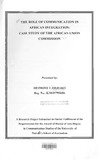| dc.description.abstract | This study proposed to evaluate the role of communication in the African Union
Commission in the integration of Africa. It thus sets out to investigate how
communication could advance or retard the vision of integrated, prosperous and peaceful
Africa, an Africa driven by its own citizens, a dynamic force in the global arena.
Using the African Union Commission in Addis Ababa as a case study, the research
examines the place of communication in the ongoing discourse of African unity, while
attempting to find out the adequacy and efficiency of communication structures, channels
and tools used by the Commission to disseminate messages, the position of member
states and government, the role of the media in the African integration process and with
what effect on the AU Commission in creating awareness among the citizenry.
Whereas it is no longer questionable whether or not media systems are powerful and can
contribute to global awareness and sophistication as proven by scholars like McComb &
Shaw's Media Agenda, buttressed by others, what however is new is the impact of mass
media on the African audiences in the pilot project of Africa's desire for deeper unity
popularly known as "the United States of Africa".
"How an issue is reported is as important as whether the issue is reported at all" said
James Dearing and Everett Rogers (1996) in an article' Agenda-Setting'. This fact as well
as the historical urge to unite Africa prompted the research topic.
As James Watson, author of Media Communication: An Introduction to Theory and
Process (2003) contends that there are many agendas, in relation to Africa's integration
agenda, this research sought to find out:
(i) Who owned the integration agenda
(ii) Obstacles to the agenda and solution
(iii) Recommendations. | en |

